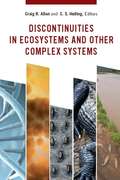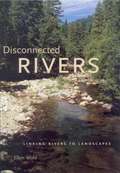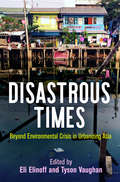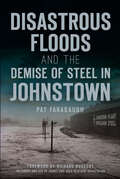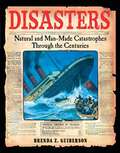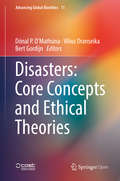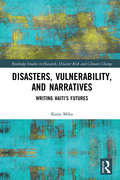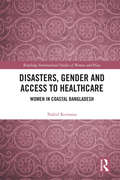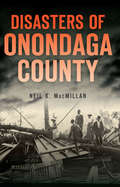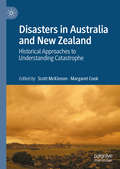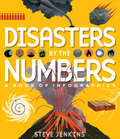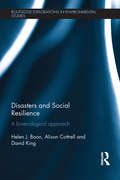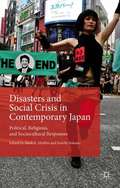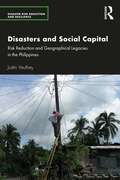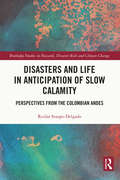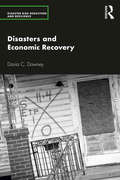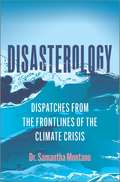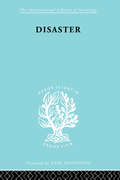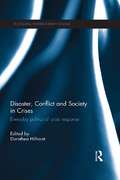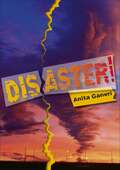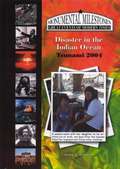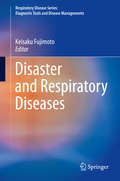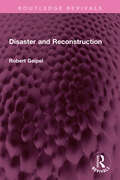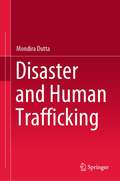- Table View
- List View
Discontinuities in Ecosystems and Other Complex Systems
by C. S. Holling Craig R. AllenA Major Contribution to Theoretical Ecology
Disconnected Rivers: Linking Rivers to Landscapes
by Ellen E. WohlThis important and accessible book surveys the history and present condition of river systems across the United States, showing how human activities have impoverished our rivers and impaired the connections between river worlds and other ecosystems. Ellen Wohl begins by introducing the basic physical, chemical, and biological processes operating in rivers. She then addresses changes in rivers resulting from settlement and expansion, describes the growth of federal involvement in managing rivers, and examines the recent efforts to rehabilitate and conserve river ecosystems. In each chapter she focuses on a specific regional case study and describes what happens to a particular river organism--a bird, North America's largest salamander, the paddlefish, and the American alligator--when people interfere with natural processes.
Disastrous Times: Beyond Environmental Crisis in Urbanizing Asia (Critical Studies in Risk and Disaster)
by Eli Elinoff and Tyson VaughanAcross contemporary Asia, each day dawns with a new story about living in an era of profound environmental change. Rapid transformations in the landscape, society, and technology produce new conflicts that are experienced at nearly every scale of life in the region. Environmental change is marked in square kilometers or micrometers, in cities or in households, within national boundaries and beyond. These changes appear in the form of radical ruptures wrought both by spectacular catastrophes like massive floods or tsunamis and by slow tragedies like the widening epidemic of asthma or the grinding processes of land dispossession. Each of these scales and phenomena reveals what it is to live in disastrous times.This book explores how people across Asia live through and make sense of the environmental ruptures that now shape the region and asks how we might analyze this moment of disruption and risk. Global environmental shifts such as climate change are usually linked to large-scale practices such as industrialization, urbanization, and global capitalism. Here, in contrast, contributors illustrate how understanding the practical, political, and ethical consequences of living in a moment of planetary change—or intervening in its course—requires engaging with the human-scale actions and specific policies that both shape and respond to such transformations at an everyday level. Coastal residents of routinely flooded Semarang, eco-conscious retirees in a Chinese suburb, and cyclists navigating air pollution in Kolkata each experience environmental risk and change in highly situated and specific ways; yet attending to their lived, quotidian experiences enables us to apprehend the complex processes that are profoundly changing the planet.Contributors: Nikolaj Blichfeldt, Vivian Choi, Eli Elinoff, Jenny Elaine Goldstein, Andrew Alan Johnson, Samuel Kay, Lukas Ley, Edmund Joo Vin Oh, Malini Sur, Tyson Vaughan.
Disastrous Floods and the Demise of Steel in Johnstown (Disaster)
by Pat FarabaughJohnstown is synonymous with floodwaters and steel. When the city was decimated by a flood of biblical proportions in 1889, it was considered one of the worst natural disasters in American history and gained global attention. Sadly, that deluge was only the first of three major floods to claim lives and wreak havoc in the region. The destruction in the wake of the St. Patrick's Day flood in 1936 was the impetus for groundbreaking federal and local flood control measures. Multiple dam failures, including the Laurel Run Dam in July 1977, left a flooded Johnstown with a failing steel industry in ruins. Author Pat Farabaugh charts the harrowing history of Johnstown's great floods and the effects on its economic lifeblood.
Disasters: Natural and Man-Made Catastrophes Through the Centuries
by Brenda Z. GuibersonNatural and man-made disasters have the power to destroy thousands of lives very quickly. Both as they unfold and in the aftermath, these forces of nature astonish the rest of the world with their incredible devastation and magnitude. In this collection of ten well-known catastrophes such as the great Chicago fire, the sinking of the Titanic, and hurricane Katrina, Brenda Guiberson explores the causes and effects, as well as the local and global reverberations of these calamitous events. Highlighted with photographs and drawings, each compelling account tells the story of destruction and devastation, and most especially, the power of mankind to persevere in the face of adversity.
Disasters: Core Concepts and Ethical Theories (Advancing Global Bioethics #11)
by Bert Gordijn Dónal P. O’Mathúna Vilius DranseikaThis Open Access Book is the first to examine disasters from a multidisciplinary perspective. Justification of actions in the face of disasters requires recourse both to conceptual analysis and ethical traditions. Part 1 of the book contains chapters on how disasters are conceptualized in different academic disciplines relevant to disasters. Part 2 has chapters on how ethical issues that arise in relation to disasters can be addressed from a number of fundamental normative approaches in moral and political philosophy. This book sets the stage for more focused normative debates given that no one book can be completely comprehensive. Providing analysis of core concepts, and with real-world relevance, this book should be of interest to disaster scholars and researchers, those working in ethics and political philosophy, as well as policy makers, humanitarian actors and intergovernmental organizations..
Disasters, Vulnerability, and Narratives: Writing Haiti’s Futures (Routledge Studies in Hazards, Disaster Risk and Climate Change)
by Kasia MikaThis book uses narrative responses to the 2010 Haiti earthquake as a starting point for an analysis of notions of disaster, vulnerability, reconstruction and recovery. The turn to a wide range of literary works enables a composite comparative analysis, which encompasses the social, political and individual dimensions of the earthquake. This book focuses on a vision of an open-ended future, otherwise than as a threat or fear. Mika turns to concepts of hinged chronologies, slow healing and remnant dwelling. Weaving theory with attentive close-readings, the book offers an open-ended framework for conceptualising post-disaster recovery and healing. These processes happen at different times and must entail the elimination of compound vulnerabilities that created the disaster in the first place. Challenging characterisations of the region as a continuous catastrophe this book works towards a bold vision of Haiti’s and the Caribbean’s futures. The study shows how narratives can extend some of the key concepts within discipline-bound approaches to disasters, while making an important contribution to the interface between disaster studies, postcolonial ecocriticism and Haitian Studies.
Disasters, Gender and Access to Healthcare: Women in Coastal Bangladesh (Routledge International Studies of Women and Place)
by Nahid RezwanaDisasters, Gender and Access to Healthcare: Women in Coastal Bangladesh emphasizes women’s experiences in cyclone disasters being confined with gendered identity and responsibilities in developing socio-economic conditions with minimum healthcare facilities. The study is situated in the coastal region of Bangladesh, considered as one of the most disaster-prone regions in the world. Bangladesh has been working on disaster management for a long time; however, considering gender perspective, the book reveals gaps in plans and raises serious questions about the successful implementation of healthcare strategies after disasters. The book also describes the pre–during–after disaster periods showing the full picture of a disaster attack in victims’ own words. Case studies of seriously affected victims give the reader an opportunity to understand the situations created for women during a disaster attack in a remote area with poor transport and healthcare facilities. These unique research findings will contribute to the broader context of gender, disaster and health studies. This book will be helpful for university staff and students of different disciplines including Anthropology, Disaster Management, Gender Studies and Geography and South Asian Regional Studies and be invaluable reading for disaster managers, policy makers, aid workers, development partners, NGOs and government, especially in disaster-prone countries.
Disasters of Onondaga County (Disaster)
by Neil K. MacmillanThe city of Syracuse and Onondaga County have a long and storied history of natural and man-made calamity. Although often considered a moderate weather region, Mother Nature has not spared it from destruction. A tornado devastated picturesque Longbranch Park in 1912, and the rare Hurricane Hazel reached Onondaga’s borders in 1954. A fire ravaged Syracuse’s famed Bastable Block building in 1923. During a children’s concert and festival, the floor of the Central Baptist Church collapsed, tragically claiming scores of lives and injuring more than one hundred. Author and historian Neil MacMillan charts the history of Onondaga County catastrophes.
Disasters in Australia and New Zealand: Historical Approaches to Understanding Catastrophe
by Scott McKinnon Margaret CookDisasters in Australia and New Zealand brings together a collection of essays on the history of disasters in both countries. Leading experts provide a timely interrogation of long-held assumptions about the impacts of bushfires, floods, cyclones and earthquakes, exploring the blurred line between nature and culture, asking what are the anthropogenic causes of ‘natural’ disasters? How have disasters been remembered or forgotten? And how have societies over generations responded to or understood disaster? As climate change escalates disaster risk in Australia, New Zealand and around the world, these questions have assumed greater urgency. This unique collection poses a challenge to learn from past experiences and to implement behavioural and policy change. Rich in oral history and archival research, Disasters in Australia and New Zealand offers practical and illuminating insights that will appeal to historians and disaster scholars across multiple disciplines.
Disasters by the Numbers: A Book of Infographics
by Steve JenkinsAn amazing look at Earth&’s natural disasters as seen through numbers, facts, and stunning infographics from Caldecott Honor–winning author-illustrator Steve Jenkins! From Caldecott Honor–winning author-illustrator Steve Jenkins comes an in-depth look at the world's natural disasters, broken down into four distinct categories: earth, weather, life, and space. From timelines of causes and outcomes of each disaster, graphs highlighting humans' effect on the earth, and a text teeming with fresh, unexpected, and accurate information ready for readers to easily devour, Disasters by the Numbers is unmatched and sure to wow fans old and new.
Disasters and Social Resilience: A bioecological approach (Routledge Explorations in Environmental Studies)
by David King Helen J. Boon Alison CottrellThe interconnectedness of communities, organisations, governing bodies, policy and individuals in the field of disaster studies has never been accurately examined or comprehensively modelled. This kind of study is vital for planning policy and emergency responses and assessing individual and community vulnerability, resilience and sustainability as well as mitigation and adaptation to climate change impacts; it therefore deserves attention. Disasters and Social Resilience fills this gap by introducing to the field of disaster studies a fresh methodology and a model for examining and measuring impacts and responses to disasters. Urie Bronfenbrenner’s bioecological systems theory, which is used to look at communities holistically, is outlined and illustrated through a series of chapters, guiding the reader from the theory's underpinnings through research illustrations and applications focused on each level of Bronfenbrenner’s ecosystems, culminating in an integration chapter. The final chapter provides policy recommendations for local and national government bodies and emergency providers to help individuals and communities prepare and withstand the effects of a range of disasters. This book will be of great interest to scholars and students of disaster and emergency management, disaster readiness and risk reduction (DRR), and to scholars and students of more general climate change and sustainability studies.
Disasters and Social Crisis in Contemporary Japan: Political, Religious, And Sociocultural Responses
by Koichi Nakano Mark MullinsJapan was shaken by the 'double disaster' of earthquake and sarin gas attack in 1995, and in 2011 it was hit once again by the 'triple disaster' of earthquake, tsunami, and nuclear meltdown. This international, multi-disciplinary group of scholars examines the state and societal responses to the disasters and social crisis.
Disasters and Social Capital: Risk Reduction and Geographical Legacies in the Philippines (Disaster Risk Reduction and Resilience)
by Justin VeutheyThis book analyzes social capital and preparations for natural hazards in the Philippines. It emphasizes the importance of inequalities, contextualization, and scale, while also underlining the significance of historical and political contexts to better understand social dynamics. Social capital continues to be a debated concept, but it can be useful for thinking about how human societies interact with natural hazards. This book contributes to the growing scientific inquiries which have begun to address the connections between social capital and “natural” disasters. Chapters explore the links between these two fields of knowledge by analyzing the Filipino situation in general, as well as detailing a specific case study of a rural municipality in the Eastern Visayas region. The book’s central argument is that economic inequality is detrimental to social capital which then has negative repercussions on preparing for natural hazards. In an analysis at several geographical scales, Justin shows how inequality, via social capital, makes societies more at risk of having natural hazards turn into disasters. The book argues that a cautious use of the concept of social capital, which is cognizant of the historical and geographical complexities of the context it is applied to, has the potential to improve the way people collectively prevent hazards from turning into disasters. It is essential reading for students, scholars, disaster risk management practitioners, policymakers, and anyone seeking to understand the complexities of climate change, inequality, and crisis resilience.
Disasters and Life in Anticipation of Slow Calamity: Perspectives from the Colombian Andes (Routledge Studies in Hazards, Disaster Risk and Climate Change)
by Reidar Staupe-DelgadoThe book provides insights into community narratives concerning life in the face of creeping calamities through a case study from the Colombian Andes. It sets out to make sense of the lived experience of disasters that are slowly unfolding as well disasters that have not yet occurred. This book explores what it means to live in anticipation of disaster and in anticipation of an uprooting of community, sense of self, and sense of belonging. It questions whether community resilience is a useful concept in the context of slow-onset geological hazards for which few viable solutions are available. The book forces us to think about how resettlement and displacement functions in the context of slow calamities, which presents distinct challenges, mainly related to lower political saliency than what is usually the case in emergencies. The book thus also has implications for how we think about the adverse impacts of climate change. By raising new questions on the nature of disasters and calamities and how we experience them, the book explores the challenges and tensions surrounding governance and governmentality. The inter-disciplinary blend of practice-oriented and conceptual reflections will appeal to academics in postgraduate and postdoctoral research in social sciences, specifically, disaster research, geography, and research fields centred on natural hazards and disasters.
Disasters and Economic Recovery (Disaster Risk Reduction and Resilience)
by Davia C. DowneyDisasters and Economic Recovery provides perspectives on the economic issues that emerge before, during, and after natural disasters in an international context, by assessing the economic development patterns that emerge before and after disaster. This book will provide a historical overview of emergency management policy and previous responses to disasters in each country, as well as the policy learning that occurred in each case leading up to the disasters under analysis. The book highlights four cases: New Orleans; Christchurch, New Zealand; the Japan earthquake and tsunami; and Hurricane Sandy in the Northeastern United States. The book places important focus on the specific collaborative developments unique to the rebuilding of each place’s economy post-disaster. Using time-series data, the book shows the emergence of new industries and job hiring patterns in the immediate aftermath, as well as provides a picture of the economic performance of each country in the years following each event. Looking at the economic development policies pre- and post-disaster, readers will glean important lessons on how to build resilient economies within the disaster framework, highlighting the differences in approaches to rebuilding local economies in places with varying levels of governmental capacity post-disaster to inform policymakers, scholars, and the disaster relief community as they plan their response to future disasters.
Disasters The Biggest Disasters in History From Salt in the Indus Valley to Hurricane Sandy
by Kieron ConnollyDisasters The Biggest Disasters in History From Salt in the Indus Valley to Hurricane Sandy BY Kieron Connolly
Disasterology: Dispatches from the Frontlines of the Climate Crisis
by Samantha MontanoPart memoir, part expert analysis, Disasterology is a passionate and personal account of a country in crisis—one unprepared to deal with the disasters of today and those looming in our future.With temperatures rising and the risk of disasters growing, our world is increasingly vulnerable. Most people see disasters as freak, natural events that are unpredictable and unpreventable. But that simply isn&’t the case – disasters are avoidable, but when they do strike, there are strategic ways to manage the fallout.In Disasterology, Dr. Montano, a disaster researcher, brings readers with her on an eye-opening journey through some of our worst disasters, helping readers make sense of what really happened from a emergency management perspective. She explains why we aren&’t doing enough to prevent or prepare for disasters, the critical role of media, and how our approach to recovery was not designed to serve marginalized communities. Now that climate change is contributing to the disruption of ecosystems and worsening disasters, Dr. Montano offers a preview of what will happen to our communities if we don&’t take aggressive, immediate action. In a section devoted to the COVID-19 pandemic, what is thus far our generation&’s most deadly disaster, she casts light on the many decisions made behind closed doors that failed to protect the public.A deeply moving and timely narrative that draws on Dr. Montano's first-hand experience in emergency management, Disasterology is essential reading for anyone who wants to understand how our country handles disasters, and how we can better face them together.
Disaster: A Psychological Essay (International Library of Sociology)
by Martha WolfensteinFirst Published in 1998. Routledge is an imprint of Taylor & Francis, an informa company.
Disaster, Conflict and Society in Crises: Everyday Politics of Crisis Response (Routledge Humanitarian Studies)
by Dorothea HilhorstHumanitarian crises - resulting from conflict, natural disaster or political collapse – are usually perceived as a complete break from normality, spurring special emergency policies and interventions. In reality, there are many continuities and discontinuities between crisis and normality. What does this mean for our understanding of politics, aid, and local institutions during crises? This book examines this question from a sociological perspective. This book provides a qualitative inquiry into the social and political dynamics of local institutional response, international policy and aid interventions in crises caused by conflict or natural disaster. Emphasising the importance of everyday practices, this book qualitatively unravels the social and political working of policies, aid programmes and local institutions. The first part of the book deals with the social life of politics in crisis. Some of the questions raised are: What is the meaning of human security in practice? How do governments and other actors use crises to securitize – and hence depoliticize - their strategies? The second part of the book deals with the question how local institutions fare under and transform in response to crises. Conflicts and disasters are breakpoints of social order, with a considerable degree of chaos and disruption, but they are also marked by processes of continuity and re-ordering, or the creation of new institutions and linkages. This part of the book focuses on institutions varying from inter-ethnic marriage patterns in Sri Lanka to situation of institutional multiplicity in Angola. The final part of the book concerns the social and political realities of different domains of interventions in crisis, including humanitarian aid, peace-building, disaster risk reduction and safety nets to address chronic food crises. This book gives students and researchers in humanitarian studies, disaster studies, conflict and peace studies as well as humanitarian and military practitioners an invaluable wealth of case studies and unique political science analysis of the humanitarian studies field.
Disaster in the Indian Ocean: Tsunami 2004
by John Albert TorresExamines the devastation caused by the 2004 Indian Ocean Tsunami, the outpouring of charitable response from around the world, and if a similar incident could happen in the United States.
Disaster and Respiratory Diseases (Respiratory Disease Series: Diagnostic Tools And Disease Managements Ser.)
by Keisaku FujimotoThis book provides valuable data on the outbreak, aggravation, treatment and prevention of respiratory diseases based on prior experiences of natural disasters such as earthquakes and tsunamis. Poor hygiene and air pollution can lead to the onset of pneumonia and other respiratory disease, while a lack of medical supplies aggravates existing pulmonary diseases such as chronic obstructive pulmonary disease and asthma. Furthermore, there are cases where those forced to live in cramped conditions, such as cars, following a disaster have developed pulmonary thromboembolism as a result of deep vein thrombosis. The large numbers of patients diagnosed with respiratory diseases make understanding the links between natural disasters and pulmonary disease vital.Disaster and Respiratory Diseases is a valuable resource for all medical staff, including physicians involved in primary care, respiratory medicine and infection control and emergency medicine, as well as respiratory surgeons. It is also useful to national and regional governments concerned about anti-disaster measures.
Disaster and Reconstruction (Routledge Revivals)
by R GeipelOriginally published in 1982 and based on empirical research into the aftermath of the Friuli earthquake in Italy, the book reflects the perspective gained over a period of four years on the event itself and the subsequent response of the local population and national government. Unique insights were gained through one of the largest questionnaire surveys ever undertaken in a disaster situation and important questions are posed concerning the policies of reconstruction. Is a disaster ‘the great equalizer’ and does regional society emerge from it with redistributed power relationships, or are established structures reinforced? Who gets hurt and who benefits? What effects do poverty, regional remoteness from central government and the ethnic and cultural dimensions have on the situation? As a substantial treatment of a major catastrophe in all its aspects, this book will be of interest to students and researchers concerned with the impact of and response to natural hazards. It is based on a unique event, but the findings it reveals are relevant to all major catastrophes.
Disaster and Human Trafficking
by Mondira DuttaThe book highlights the root cause of human trafficking and analyses how factors of vulnerability affect the marginalized, especially during and after a disaster. Human trafficking like other studies on disaster research, needs to be tackled from various perspectives such as empowering the vulnerable people, creating awareness, strengthening the disaster risk reduction measures and creating a common platform to fight the vicious circle by breaking its continuity and making strategies victim centric and people friendly.The book adapts a multidisciplinary approach embedding concepts from political, social, economic and anthropological perceptions. The discourse in the book revolves around the emotional and psycho-social stress factors including weak implementation of laws and policies at various levels. The content weaves around three themes -- magnitude and interlinks between disaster and human trafficking; policies and protocols on disaster risk reduction and human trafficking and community participation and institutional support. Through these themes, the volume works on identification of the vulnerable areas which are not in compliance with the Sendai Framework of Action, 2015 in the backdrop of the Disaster Management Act of India, 2005. The volume will be of immense interest to a wide range of practitioners, researchers, academicians, policy makers, political leaders, gender experts, international organizations, disaster management authorities, civil society organisations, and scholars working in the area of human rights in general and trafficking in particular. Note: This research was funded by Indian Council of Social Science Research (ICSSR).Human Trafficking is complex, layered and lies at the intersections of multiple vulnerabilities, gender being among the most significant ones. This gets exacerbated during both natural and human made disasters. Any attempt to either understand or address it will be fraught with challenges if women and girls' unique vulnerabilities, as well as their needs, voice, choice, agency and safety is not centre-staged in any effort. Mondira's book does exactly that...it succinctly and in simple words explores the compounding discriminations, including structural inequalities, that cause and result in women and girls differential gendered vulnerabilities to being trafficked during disasters. Once this is understood, the solutions can be specific, gender responsive, and sustainable.- Anju Dubey Pandey, Gender Responsive Governance and Ending Violence against Women Specialist, UN Women, New Delhi, India
